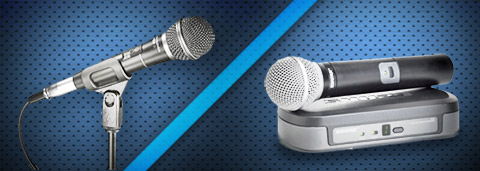A question many churches face these days is which microphone is best suited for my worship team vocalists? There seems to be an unending array of options to choose from. You also have to ask the question – how can I pick a great quality microphone and still be a good steward of our church budget? Well, I am going to introduce you to 3 microphones that you will want to have in your audio arsenal every weekend.
The Workhorse
The first is the SM58 by Shure. This is one of the most widely used vocal microphones out there. It is the very definition of industry standard. Church Tech Directors and Music industry producers across the globe agree that the SM58 is the best investment you could ever make. At a price of $99 new or about $60 used, your church budget will not even notice the purchase. I myself own 4 of them and bring them to every gig I ever work. It has a standard cardioid pattern, its dynamic so it requires no phantom power, and it is built like a tank. These microphones are the ones you want in your youth ministry. They can take a variety of abuse, dropped, kicked, thrown, dented and scratched and still sound and work beautifully. On the rare occasion that you ran over one with your truck, parts are readily available or you can replace it with a new one for a hundred bucks. When it comes to signal quality, every audio engineer knows that the SM58 will provide a quality image of the signal source. I have a personal story that will shock and amaze some of you about the SM58, but Ill wait ‘til the end of the article to share that with you.
High Times
The second mic I want to talk about is also made by Shure, the Beta 87. This microphone is not better or worse than the SM58, but it is quite different. The Beta 87 is a condenser and has a Super-cardioid pattern. It has a noticeably brighter tone and audio engineers love it because it can help vocalists stand out and really break out of the mix. Although I have noticed that when I use it with a female voice it can get a little too bright. As a result I usually use it on male worship leaders with a lower tone. It helps balance out their sound and can really give them a better sonic image. This mic rings in at $250 for a new one, but you can find them used for about $180. One of the male worship leaders at my church uses one of these and he couldn’t imagine using any other mic, but everyone else uses an SM58
Mids
What about a mid range mic? The Neumann KMS 105 is a super high quality microphone and a favorite to many audio engineers. But this microphone is also a supercardioid condenser, a lot like the Beta 87 I mentioned above. Some engineers suggest that the KMS 105 has a much more “open” tone to it. It sounds as if the speaker or vocalist is not tied to the sound system at all; as if the microphone disappears and the person’s voice is perfectly represented in the sound system. At $700 this little guy will put a noticeable dent in the church budget. Also, an interesting fact about the KMS 105 is that it does not have a foam windscreen within the basket, so that way the brightness can come through crystal clear.
In all honesty, once you get past paying $300 for a microphone, the actual differences that you can notice really depend on the other parts of your sound system. If your PA is brand new and built with your recent building campaign, invested with several hundred thousand dollars, you might be able to hear the subtle differences. But if you are like 95% of the churches in America and have an economic, but still quality and efficient PA system, a member of your congregation would not be able to tell the difference between a $250 Beta 87 and a $700 KMS 105. Your vocalist might be able to tell a slight difference through their in-ear monitors, and a sound guy with extensive ear training might notice a minimal difference in the house mix, but would spending that much be worth it? After all, if you take that $700 and shop on the used market you could buy a few Beta 87s or enough SM58s to mic an army. There are literally hundreds of vocal microphones out on the market and the higher price you pay, the more specific and specialized they get, but the subtle differences can be very hard to distinguish depending on the rest of the PA.
Good Enough for the Pros
Last month I was asked to work an event with Brenton Brown. I’ve worked with Brenton on a few different occasions and he is always a pleasure to run sound for. I selected a microphone for him, a very fancy and very expensive mic that cost over $2,000. Knowing that he has spent considerable time in the studio and leading worship, to say he has a trained ear would surely be an understatement. I also knew that the state-of-the-art sound system that was being provided for the event would enable him to hear and appreciate the quality sound this microphone would provide. But within 45 seconds of his sound check he stopped and very politely requested if we could change the mic he was using, which I was more than happy to do. He requested a Shure SM58. I was shocked! Here I am standing in front of one of the most influential worship leaders of the last decade, who could hand pick any microphone he wanted, and he chose the Shure SM58 that was dented and scratched. Why did he pick that mic? Because he knew what it would provide. He knew that although it was not fancy and super expensive, it was a solid rock of a microphone and he knew exactly how his voice would sound through it. Later he even commented on how the windscreen had a dent on it from being dropped, but he liked it because it was perfectly placed for the tip of his nose
The best way to find a mic that works best for you is to try them out on your sound system. If you have not already, find an Audio/Video vendor in your area and ask them to demo some of their mics. Better yet, connect with other local churches in your area and ask them what they are using, and ask them if they could trade you for a week or two while you try different mics. I know a number of audio engineers at the local churches in my area, and when we are looking to buy some new microphones or other pieces of gear, they are more than willing to let me try out what they use at their church. At the same time, I am more than willing to let them demo some of the mics we have chosen to buy. The bonus of it, is building a great Christian community and professional network is just gravy on top.
I recently wrote about wireless versus wired microphones, read it here.
![]()

Jordan Tracy hails from Overland Park, KS and has been a church Audio and Tech Engineer for over 12 Years. He’ll take Sandals over shoes any day of the week and loves spending time with his wife. Follow Jordan on Twitter.

